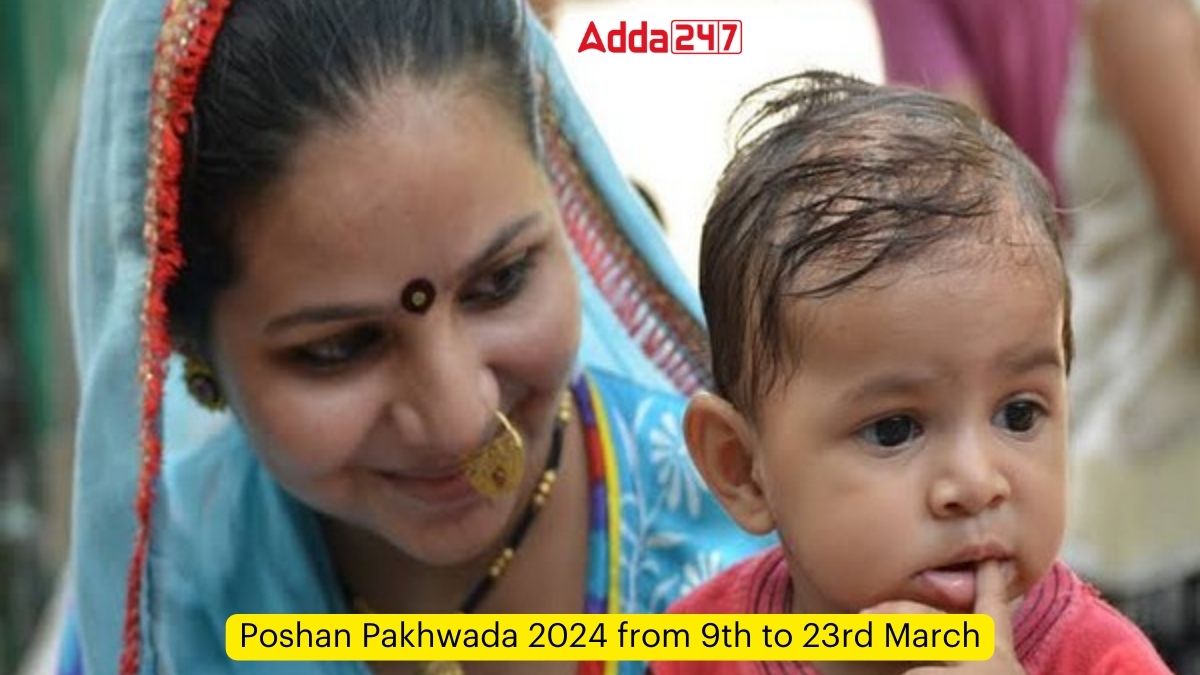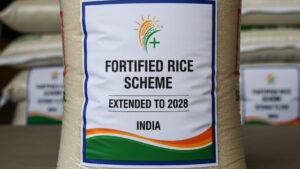What is Poshan Pakhwada?
The Ministry of Women and Child Development will organize Poshan Pakhwada nationwide from March 9 to March 23, 2024. This 15-day celebration aims to spread awareness about nutrition, dietary practices, and women’s health.
Poshan Pakhwada 2024 Theme
The main focus theme’s for activities and awareness during Poshan Pakhwada 2024 will be:
- Poshan Bhi Padhai Bhi (PBPB) – Promoting better Early Childhood Care & Education (ECCE)
- Tribal, Traditional, Regional, Local dietary practices – Sensitizing about nutrition
- Health of pregnant women & Infant and Young Child Feeding (IYCF) practices
Other important themes include:
- Improving nutrition through Mission Life (water conservation, rainwater harvesting)
- Promoting Millets & Poshan Vatikas (kitchen gardens) for sustainable food systems
- Adopting healthy lifestyles through Ayush practices
- Focus on Water, Sanitation and Hygiene (WaSH) and diarrhea management
- Test, Treat, and Talk Anemia
- Swasth Balak Spardha (SBS) to promote regular growth monitoring of children at Anganwadi Centres (AWCs)
Previous Poshan Pakhwadas
During the last Poshan Pakhwada in March-April 2023, over 4 crore sensitization activities were conducted. These focused on promoting Shree Anna (fortified rice), millets for nutrition, celebrating Swasth Balak Spardha, and popularizing Saksham Anganwadis.
Since the launch of POSHAN Abhiyaan in 2018, over 90 crore sensitization activities have been reported through 5 Poshan Pakhwadas and 6 Poshan Maahs (months).
Objectives of Poshan Pakhwada
Key objectives include achieving nutrition-linked behavioral change at individual and community levels through Jan Bhagidari (public participation).
The Pakhwada aims to raise awareness about the importance of nutrition and promote healthy eating habits through “Jan Andolan and Jan Bhagidari” (public movement and participation).
Poshan Abhiyaan, launched by PM Narendra Modi in 2018, has been instrumental in ensuring people’s participation and bringing the discourse on nutrition to the forefront.
How to download the Poshan Pakhwada app?
To download the POSHAN Abhiyaan app, you would typically need to visit the official POSHAN Abhiyaan website or find it on the Google Play Store for Android devices. However, it seems there was an issue accessing the official website just now.
Here’s a general guideline on how to proceed:
For Android Users:
- Go to the Google Play Store on your Android device.
- Use the search bar to search for “POSHAN Abhiyaan” or “Poshan Tracker,” as it may also be listed under this name.
- Look for the official app published by the Ministry of Women and Child Development or the Government of India.
- Click on “Install” to download and install the app on your device.
For iOS Users:
- The availability of the POSHAN Abhiyaan app on the Apple App Store may vary, so you would need to search the App Store in a similar manner to see if it is available for iOS devices.
- Remember to only download apps from official and verified publishers to ensure the security and authenticity of the application. If you’re unable to find the app, it could be helpful to check the official POSHAN Abhiyaan or the Ministry of Women and Child Development website for more information or any announcements related to the app’s availability.
What is POSHAN Abhiyaan?
POSHAN Abhiyaan, also known as the National Nutrition Mission, is a flagship program of the Government of India aimed at improving nutritional outcomes for children, pregnant women, and lactating mothers. Launched in March 2018 by the Prime Minister, the mission seeks to reduce levels of undernutrition, anemia, and low birth weight in children, as well as to focus on adolescent girls, pregnant women, and lactating mothers. The program harnesses technology, a targeted approach, and convergence to achieve its goals and has set specific targets to be achieved by 2022, which include:
- Reducing stunting in children aged 0-6 years by 2% per annum.
- Reducing undernutrition (underweight prevalence) in children aged 0-6 years by 2% per annum.
- Reducing the prevalence of anemia among young children (6-59 months) by 3% per annum.
- Reducing the prevalence of anemia among women (15-49 years) by 3% per annum.
- Reducing low birth weight by 2% per annum.
Key Components of POSHAN Abhiyaan:
- Convergence: Bringing together various ministries and departments at the national, state, district, and village levels to work towards common nutrition goals.
- Use of Technology: The Abhiyaan employs technology for real-time monitoring and tracking of growth of children and the status of pregnant and lactating mothers. The Integrated Child Development Services-Common Application Software (ICDS-CAS) is an example of technology used for improving service delivery and program management.
- Jan Andolan (People’s Movement): Encouraging public participation to create a mass movement (Jan Andolan) towards achieving nutrition goals. This involves engaging with local communities, self-help groups, and the use of mass media to spread nutritional awareness.
- Capacity Building: Training and capacity-building of frontline workers such as Anganwadi Workers, ASHA workers, and ANMs who are directly involved in the community-level delivery of health and nutrition services.
- Innovations and Incentives: Promoting local and innovative solutions to address malnutrition and incentivizing states and Union Territories to meet the targets.
- Nutrition Resource Centers: Establishing Nutrition Resource Centers to help improve the implementation of dietary guidelines and promote healthy nutritional practices.
POSHAN Abhiyaan is designed to leverage existing programs and schemes such as the Integrated Child Development Services (ICDS), National Health Mission (NHM), Janani Suraksha Yojana (JSY), and Swachh Bharat Mission, among others, to achieve synergy and maximize impact on nutrition. The mission is a critical step towards addressing the multi-dimensional nature of malnutrition in India and achieving the Sustainable Development Goal (SDG) of ending all forms of malnutrition by 2030.





 SASCI Scheme Boosts Tourism Development ...
SASCI Scheme Boosts Tourism Development ...
 Fortified Rice Scheme Extended to 2028 w...
Fortified Rice Scheme Extended to 2028 w...
 West Bengal Launches ‘Shramshree’ Scheme...
West Bengal Launches ‘Shramshree’ Scheme...

